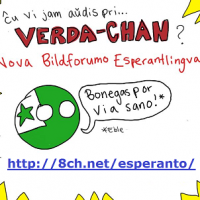Příspěvky: 80
Jazyk: English
Tempodivalse (Ukázat profil) 4. června 2015 0:48:59
So I understand why some people would feel strongly. The amount of everyday ignorance about non-binary and transgender individuals, and LGBT more generally, is astounding. We should keep this in mind.
Never the less, it would be preferable if this sensitivity didn't spill over into linguistic discussions. I have indicated elsewhere that grammatical gender is not social or biological gender.
Red_Rat_Writer (Ukázat profil) 4. června 2015 1:43:45
I would also like to add that most Esperantists are bilingual and probably are not stupid. So you can pretty much use any pronoun you want; oni, tiu, li, sxi, gxi, sxli, ki, ri, fi, ti, ii, sxafi, buni, but you have to remain consistent. If you use the pronoun consistently, people will get what you're trying to do (though if you add too many words, it will quickly become a garbled mess).
Even if people disagree with adding another pronoun, they will get that it's another pronoun and not a spelling mistake.
erinja (Ukázat profil) 4. června 2015 2:51:16
Some Esperanto books contain words made up by the author (usually an esperantized version of a word from another language). They are generally indicated with an asterisk when they first appear, and explained in a note at the bottom of the page. That could easily be done here as well.
orthohawk (Ukázat profil) 4. června 2015 3:08:15
erinja:Also, this is a story and not a language textbook. People are creative in real life with their non-gender-binary pronouns, so there's no reason why the story can't be creative as well.which is basically what I said earlier (specifically my first post on this thread, #3 on the thread in general.)
Some Esperanto books contain words made up by the author (usually an esperantized version of a word from another language). They are generally indicated with an asterisk when they first appear, and explained in a note at the bottom of the page. That could easily be done here as well.
yasmin_chanelle (Ukázat profil) 4. června 2015 3:44:14
- -not causing a disruption (by means of being a reformism)
-being recognizable
-preferably not being a reformism
-doesn't stick out too much
PS
On the front of not sticking out and being recognizable, it's true, this isn't a text book, it's a comic book, but I am trying to stay on the colloquial side so it seems more natural in tone, the magic spot between stiff and substandard.
Tempodivalse (Ukázat profil) 4. června 2015 3:57:20
I think that with time, as awareness of transgender and non-binary issues increases, the Esperanto community will slowly establish a precedent for one or another term - whether it be ri, ĝi, ili, or something else. The language just hasn't gotten there yet; it's evolving, and tends to lag a few years behind real world developments. (For instance, it wasn't till the mid-late 80s, as I recall, that the term for "computer" was conclusively established.)
----
[1] The difference between tio and tiu is notoriously difficult for English speakers, but this is the general gist. You don't use standalone tio to refer directly to humans, except in descriptive situations like Tio estas mia patro - that is my father.
whysea (Ukázat profil) 4. června 2015 6:51:36
naturavivas (Ukázat profil) 4. června 2015 7:06:48
I have some little points to comment. Well, indeed the sence of ĝi in Esperanto is vast (and indeed similar to that one of English it with the exception that one can use ĝi for words like homo or infano) and whatsoever one could use it with no problem in Esperanto, however one should have the right to not be demanded to do so. And I fully understand this worry you have about the use of ĝi (I as well have similar worries, even if the word ĝi would be ok, it's too vast and applies for almost everything and therefore everyone but it could not have that sence of personhood). However, I think that a separate not vast that much expression could be useful. Interesting things are possible, as one maybe already mentioned. One could use the pronoun ri, even if whose etymology in the sense of riismo be that which I use - i.e. there's this interesting fact that 1881 Praesperanto has a pronoun ro (all the pronouns finished by o then) which meant the same as li and ĝi (the riismo sence is a bit different from that but the presence of a human-ĝi is already present in this Praesperanto ro). This information appears in a book by Gaston Warighien called Lingvo kaj Vivo page 42. (published at the first time in 1959, several decades before riismo came up, and therefore it's possibile that riismo was inspired in this ancient pronoun). Use of singular ili could also be interesting, also because the same thing which happened with English you happened with Esperanto vi. Ŝli is interesting and it isn't necessairly binary, because it can mean "he and she" and in this sence could be useful for bigenders for instance. Same people say it's pronounceable. Interestingly, one just did that. And interestingly, there're words likse ŝlosilo or ŝranko (not to mention sciencisto
 ). The literature has a poetical license
). The literature has a poetical license  and and this could even influence the everyday use as well.
and and this could even influence the everyday use as well. By the one, it's interesting to note that beside this discussion there's another sence of pronoun, kinda personal one such as it happens in English non binary pronouns which vary from person to person.
About tiu I have a remark. Tiu doesn't automatically mean "that person", it is non defined. It means simply that + the word. Tio indeed means tiu io, that thing. The same happens with Iu. Note one can say "Tiu tago" or "Iu tago". Tago (day) is not a person. But when used alone, the word iu and the word tiu reffer to individuals (because it simply means that one or some one, and the word disappered). And individual often understood as a person (indeed the meaning of the alone-version of Iu is some one in the sense of living being or person pretty much). When one uses the tiu alone, similar process happens. Because of Esperanto's regularity, the sence of individual/person happens also with the word tiu. However, it may lack of intimacy compairing to neutral pronouns. Again I agree with you pretty much.
naturavivas (Ukázat profil) 4. června 2015 7:14:04
bartlett22183:This is one of those few instances in which some other contructed international auxiliary languages have an advantage over Esperanto. Ido, for example, has the third person singular pronoun 'lu', which does not refer to any particular sex or (grammatical) gender. A sort of, "that one to whom I have just referred."An idea appeared now in my mind. The use of words from Ido is often in Esperanto-literature and even in day-by-day life. In this sense, one could use Ido's lu with no problem (even because Ido things are related to Esperanto and in this sense are a part of Esperanto culture).
orthohawk (Ukázat profil) 4. června 2015 16:02:50
naturavivas:Except that "lu-" means "rent, hire"bartlett22183:This is one of those few instances in which some other contructed international auxiliary languages have an advantage over Esperanto. Ido, for example, has the third person singular pronoun 'lu', which does not refer to any particular sex or (grammatical) gender. A sort of, "that one to whom I have just referred."An idea appeared now in my mind. The use of words from Ido is often in Esperanto-literature and even in day-by-day life. In this sense, one could use Ido's lu with no problem (even because Ido things are related to Esperanto and in this sense are a part of Esperanto culture).




